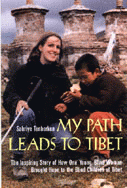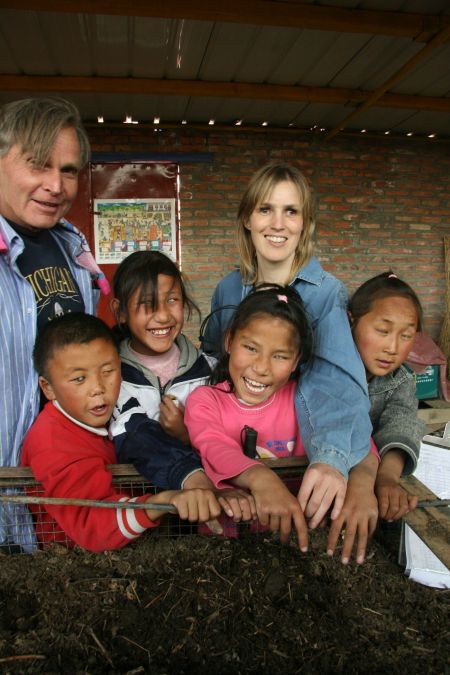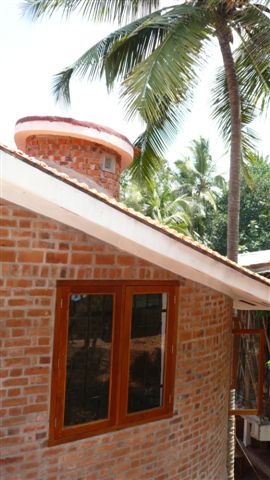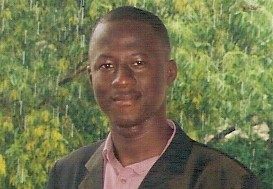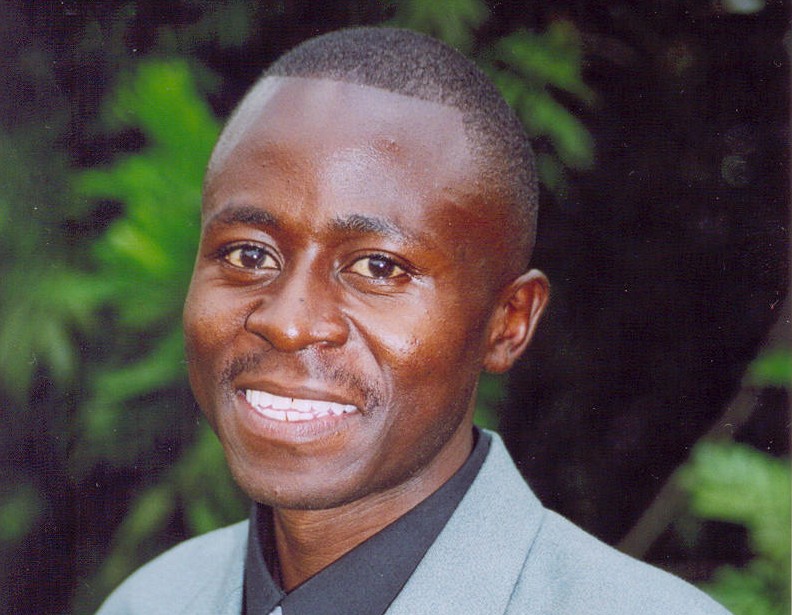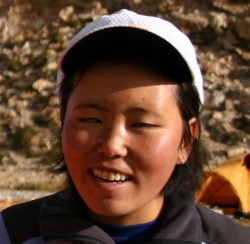
|
Click to make font larger
Dear friends and
supporters,
Once again, the last
half year has rapidly passed us by as event followed upon event-- some
upsetting but most, positive and promising. We herewith send you an
update on the events of the first 6 months in 2008.
January
Touring
Germany with a bodyguard
The
Blindsight movie promotion
“I am Markus, body guard, driver, tour guide and
‘jack-of-all-trades’. This introduction from Markus was how we began
our 2-week tour through 23 cities in Germany and Switzerland. It was an
intensive promotion tour for the documentary Blindsight and thanks to
Markus’ humor and laid back style we were spared any cardiac events
that ‘performing’ in 23 cities in 14 days could induce. It felt a bit
strange to travel with a body guard. But Markus would ‘watch our backs’
during interviews and autograph sessions, though we hardly considered
that necessary. I guess Markus had worked with real celebrities before,
unlike our simple selves and always expected the unexpected. Once, in
this mode, he almost man-handled a well known local politician who
approached out of nowhere. And wrestled down an old school friend of
mine whose approach he judged to be too brisk. Unfortunately, despite
well-attended premieres and mostly positive reviews in radio,
television and press, our little promotion tour didn’t produce the kind
of help and support we were hoping for. In fact, we ourselves are still
hoping for our own DVD of the Blindsight documentary.
February
When
Tashi meets Mickey Mouse and Jaws jumps from the water
Travelling the
US with five blind Tibetans
“„Pfuidje! What's that? A huge rat??” This was
the first reaction of our blind and visually impaired Tibetan
youngsters to a 1,5 meter tall rodent-like object that boogied up to
them. It took some
time to explain who Mickey Mouse was and that this apparition was just
a student earning some pocket money by schlepping a costume, and not
"Ratzilla".
Tashi, Kyila, Dachung, Bungzo and Gyendsen had
been invited by the Blindsight producer Sybil Robson to a one-month US
adventure tour. Tendsin, the sixth member of the Blindsight team, did
not manage to get his passport in time and had to be content with
listening to the stories of the others when they got back to Tibet from
the USA.
What especially impressed them? Ice-skating in
Central Park, hanggliding, fastfood and roller coasters. At a press
conference,someone asked them what they liked best. Right away, Bungzo
answered for all of them: “Spacemountain!“ This is a breakneck
rollercoaster ride that they took six times before their chaperone
Paula Davie, or rather her knees, protested. And at Universal Studios
they were surprised by her frightened screams. They were even more
puzzled when she explained that "Jaws" (the famous movei shark) ,had
suddenly
emerged from the watery set. Our blind Tibetan youngsters only know
Jaws as
the name for a speech synthesizer program for the visually impaired.
In a report, Kyila summarized the trip: “ We
thought that every blind person in America was like Erik, (the first
blind person to summit Mt.Everest) but now we have the feeling that we
in the blind project here in Tibet, deal with our blindness as
confidently as a lot of American blind persons and our
mobility
and computer skills are similar as those of many American blind.”
There was a session with blind American
teenagers about leisure time activities. Most of them mentioned they
liked listening to the radio. One of them liked
playing computer games for the blind. “Do you sometimes go out as
well?“ I asked the American blind. Yes, they replied, if they had a
free driving service for the disabled they would sometimes go to events
especially organized for the blind. Our blind Tibetan
kids described how they liked to sing, dance, play musical instruments,
go out with sighted friends, kayak, raft, work out and ride horses on
our farm in the countryside.. Horse riding is the favourite sport for
many of our blind children. Some of them will jump on a horse without a
saddle and race through the farm fields and up and down the lanes. On
one occasion we had to extract a hat from a low lying branch. No, don't
worry, it
did not contain a head :-). The American leisure time expert, himself
blind,
protested: “Horse riding! Sure, but you have to make sure that the
horse is well-behaved, docile and that sighted people go along to lead
the horse.” (As though it was the horse that was blind.)
March
The
press marathon
Blindsight
in the US
Fortunately, we could use the US movie promotion
tour and the press attention surrounding Blindsight, for fund raising.
The producer Sibyl Robson and Ed Weihenmayer, Erik's father, were very
helpful in helping us to find interested sponsors. After one of our
Blindsight shows, a publisher for childrens books jumped on stage to
declare that he would support the Centre for the Blind in Tibet with a
substantial donation. A US-based company organized a fundraiser among
their
employees. The privately collected donations were matched by the
management.
Sibyl organized auctions at which prayer wheels
and virtual yaks were auctioned and she made sure that Braille Without
Borders was mentioned in the press over and over again.
We had thought that nothing could surpass the
media attention we got in Germany. But the US proved us wrong. For
almost one month, Paul, I and the complete BLINDSIGHT promotion team,
travelled from one city to another, from
one interview to the next. It was interesting to note the qualitative
difference among the journalists. One of the moderators asked us –
luckily before the show –
whether 'Thaibet' also belongs to Thailand. Others presented Blindsight
as a movie about an Everest climb with six blind children rather than
teenagers attempting to summit the neighbouring mountain, Lhakpa Ri,
next to Everest. It was an
ongoing challenge to clarify things during live shows without the
moderators losing face.
· On the other hand there were media
people who took a lot of effort to inform and prepare themselves for
the interviews. A common question was the possible impact of the
documentary filmteam on the
expedition. Would there be additional pressure on the the
professional mountaineers who accompanied the blind youngsters, to get
to the
top by all means? We explained that the presence of the filmteam did
worry
Paul and I initially. But the producers of the film and our
professional climbing mates assured us that our six blind teenagers,
their
life stories and their own ‘personal Everests’ was the focus of the
film. And as it turned out the film became an exploration of the blind
person’s ‘point of view’ and the ‘blind spot’ that often blocks the
vision of the sighted.
April
Chaotic
days in Tibet
Unrest
in Lhasa
· On the morning of March 14th, the day of
the unrest, I was woken up at 5:30 am by a phone call from CNN, one of
the largest TV channels in the US. A psyched female voice asked me
whether I had heard of the turbulence in Tibet. She wanted a commentary
on the current situation and wanted to send a broadcasting car to
wherever I was. I
explained to her that I did not want to make any statement on
the current situation in Tibet, but the woman just kept talking at me.
. It took a while for her to respect my wish but in the end she let me
go.
· In the German project office as well,
that whole day, we received requests for interviews from TV channels
and radio stations worldwide. To escape the media and worried about our
students and teachers, we cancelled the rest of the Blindsight tour and
with Sybil's generous help, travelled back to Tibet.
· To inform ourselves about the situation
there, we talked to some ex-pat witnesses on our way to Lhasa. A
children's doctor who had worked for an organization in Lhasa during
the unrest, told us that he was in a hotel not far from the city centre
when everything started. He described that angry people, young and old,
moved through the streets causing harm to persons and property. Then
the attack on the mosque and the attempted attack on his hotel. Guests
barricaded themselves in their rooms, the bath tubs filled with water
just in case and armed themselves with iron rods for defence.
· The old Tibetan section of town was
under thick clouds of smoke. Shops had been set on fire regardless
whether there was still someone inside or not. Our employees also
remember: Everything started on 14th March around lunch time. They
would have probably not even noticed anything about the street riots if
there hadn't been sudden calls by friends, relatives and officials
warning them to stay inside the school and away from the streets. But
no one knew details. They could hear screams and sirens, but only from
the distance. Fortunately, all the younger students were at school and
the older ones were at the massage clinic. Imagine what it would have
been like for a blind person in the street at that time.
· Then a call from the massage clinic. The
students and some of the masseurs were not able to get out. “It was
really
scary.“ said Yudon, “ We wanted to get to the school, but
it was too dangerous to leave the place!“ Nyichung, the
clinic's cook, was pregnant and supposed to
have her baby soon.. But initially, there was no possibility to get her
into a hospital. They heard screams directly from downstairs on the
Beijing Dong-Lu. When they wanted to open the window, people yelled at
them not to look outside. And all the smoke! A few houses further some
Chinese stores went up in flames. We were afraid that the encroaching
flames may cause a fire at the massage clinic as well.“
· Now, four months later, things are more
or less back
to normal. Only the crowds of tourists are absent. Many hotels and
restaurants have had to close down. We hope that a good solution can be
found for all.
May
· The scent of compost
and the organic bakery
·
Developments at the training farm
·
· A dream for many years, has been the
establishment of an organic bakery where blind students could learn how
to bake healthy tasty bread. The bakery is nearing completion. Part of
the organic bakery is given over to a café where blind learn
restaurant management. Paul designed the "dream building" for this-- a
solar-heated crescent shaped design overlooking the farm’s willow
ringed duck pond.
June
Do
you need vision to be a visionary?
The
International Institute for Social Entrepreneurs (IISE) nears its
launch
· After two years of construction work we
are nearly done. The buildings of the IISE campus are currently
getting their finishing touches as we prepare to start furnishing the
rooms in preparation for the participants from all over the world.
· Selection procedure
· To be selected for the IISE, candidates
have to show a high level of motivation and commitment and have a clear
vision of how they would contribute to their society. Furthermore, they
need to have adequate mobility and English language skills.
· The question arose how to evaluate a
candidate’s ability not only to ‘talk the talk’ but to walk it too,
ie,,the ability and motivation to create centers for blind empowerment.
We needed someone who had expierence in leading telephone interviews.
We thought of the psychologist Thomas Hill, a long-time friend. He and
his wife Constanze agreed to interview our applicants. Constanze and
Thomas Hill are both blind and have plenty of experience in HR
interviews. Constanze is a successful host of an Austrian radio talk
show, where many people seek guidance.
· The most promising applications were
forwarded to the Austrian selection committee to choose the first
generation of IISE participants in two intensive rounds of interviews.
· We have selected 30 committed and
highly-motivated participants from 19 countries. Enabled and prepared
by IISE, they would like to set up a social project in their own
country or country of choice.
·
The IISE Curriculum
· A journey in five acts
· The course at IISE can be compared
neither to a university degree nor to something like a management
seminar. It is much more a journey along which one strengthens one's
own abilities to create ideas and develop methods to make these ideas
come true.
· The 11-month program is divided into
five acts:
· Act One: Where am I, who are you?
- Introduction to IISE
- Exchange about objectives
- Getting to know the environment
· Act Two: Finding my Voice
- Communication
- Public relations
- Dealing with the media
- Holding speeches, drama school, stage training
· Act Three: Mind Travel
- Recognizing and discussing different cultural
backgrounds and traditions
- Dealing with social, political and
environmental movements
- Training in management
· Act Four: Going out and coming back
- Internships in various projects
- Evaluation
· Act Five: The sky is the limit
- Preparation for the realization of the
individual’s own ideas and expectations
- Final proposal and public presentation of their
projetcs.
·
Outlook
· In November this year, the
German magazine “Bild der Frau“ will award five German
women.
The award is titled "Die goldene Bild der Frau". Readers may vote for one woman who will receive 30,000 Euros in addition to the 10,000 Euros reward for the respective projects. We would be very glad if you voted for the Braille Without Borders project so it would benefit from the extra monetary award: · Readers as well as non-readers of the
magazine may also vote through the following webpage:
· http://www.bildderfrau.de/ueber-bild-der-frau/goldene-bild-der-frau/abstimmung.html
(select Sabriye Tenberken and then click on the grey button: "Abschicken") MANY THANKS FOR YOUR VOTE!
· Acknowledgment
·Our Administrative Director, Tigi Philip,
unfortunately had to leave the IISE after two years of fruitful
service. In the name of all future participants, we would like to thank
her for her strong commitment and wish her all the best for her future
endeavours.
·Dear friends,
· In the name of the blind children in
Tibet and the future participants of the IISE, we would like to take
the opportunity to thank you for your support, friendship and
suggestions.
With very best wishes,
Sabriye Tenberken, Paul Kronenberg,
Founders / Directors
Braille Without Borders |
||||||||||||||||||
